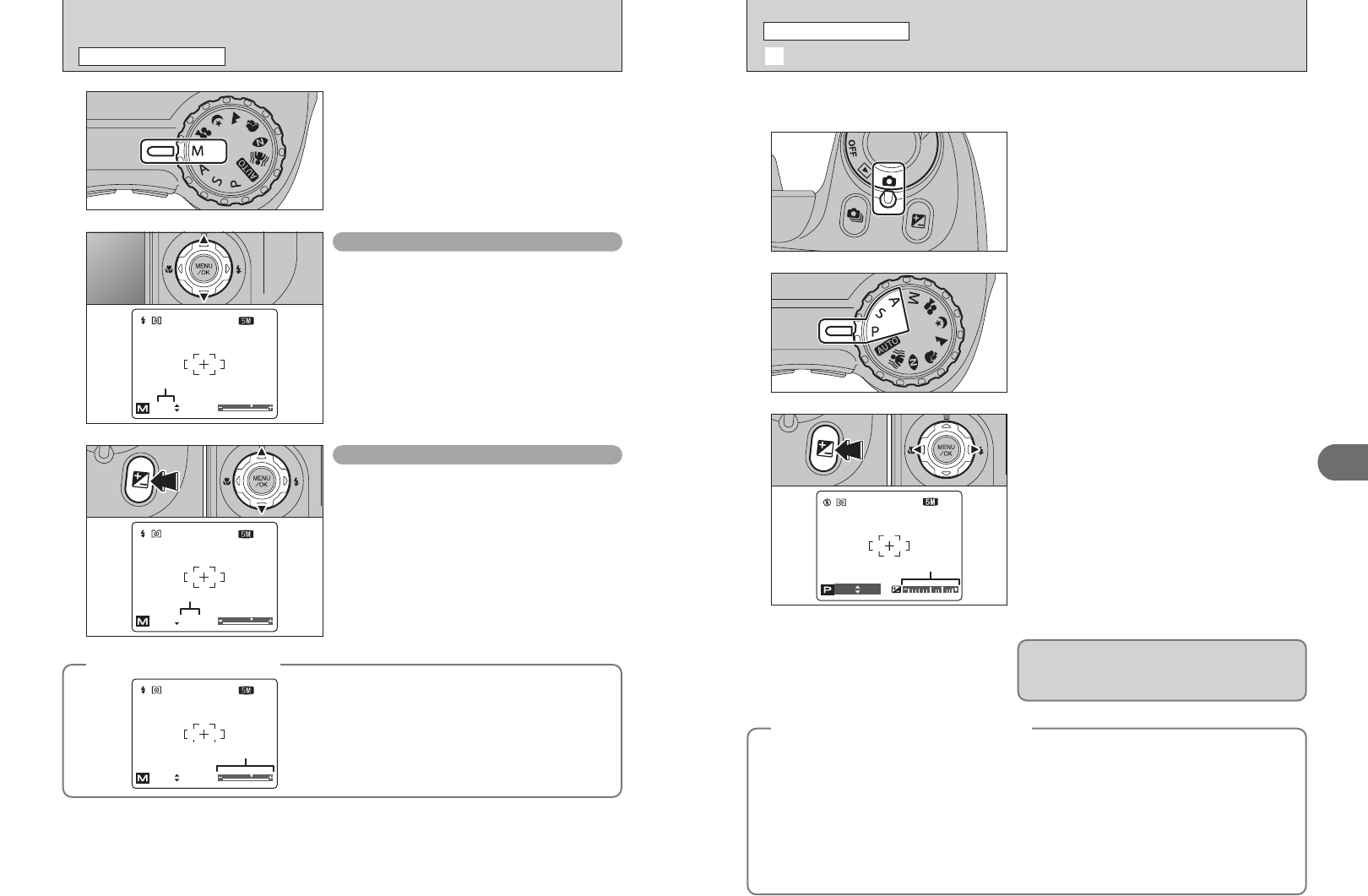
42 43
Advanced Features
3
> MANUAL
PHOTOGRAPHY FUNCTIONS
Set the Mode dial to “>”.
Use Manual mode to set any shutter speed and
aperture setting.
Setting the shutter speed
Press “a” or “b” to select the shutter speed.
hShutter speed setting
15 sec. to 1/2000 sec. in 1/3 EV increments
●
!
See P.130 for information on EVs.
●
!
Use a tripod to prevent camera shake.
●
!
In shots with long exposures, noise (dots) may appear on the
image.
●
!
If the shutter speed is set to a speed faster than 1/1000 sec.,
the image may appear dark even if the flash is used.
Setting the aperture
1Hold down the “D” button.
2Press “a” or “b” to select the aperture.
hAperture settings
F3.2 to F8 in 1/3 EV increments
250
F
3.2
Shutter speed
ISOISO
200
121212
NNN
250
F
3.2
Aperture
ISOISO
200
121212
NNN
01 02
◆
The exposure indicator
◆
Use the exposure indicator on the screen as a guide
when setting the exposure.
When the brightness of the subject is outside the
camera’s brightness metering range, the exposure
indicator disappears on the screen.
250
F
3.2
Exposure indicator
ISOISO
200
121212
NNN
250
FF
3.2
121212
NNN
ISOISO
200
ISO
200
ISO
200
Exposure
compensation
indicator
Exposure
compensation
indicator
Exposure
compensation
indicator
Use this function for shots to get the correct brightness (exposure), such as shots with extremely
high contrast between the subject and the background.
Set the Power switch to “q”.
1
Set the Mode dial to “N”, “M” or “<” mode.
2
1Hold down “D” button.
2Press “d” or “c” to set the compensation value.
The symbol indicating the compensation direction
(– or +) turns yellow. The “D” icon also turns yellow
while exposure compensation is being set and then
turns blue after setting is completed.
hCompensation range
–2 EV to +2 EV (13 steps in 1/3 EV increments)
●
!
Exposure compensation cannot be used in the “B”, “√”,
“
À”, “U”, “,”, “/”, “>” and “r” modes.
●
!
The screen brightness will increase or decrease depending
on the exposure compensation setting.
●
!
The following disables exposure compensation:
Shooting dark scenes in Forced flash “
d” or Red-eye
reduction mode “
b”
This setting is retained when the mode is changed
or the camera is turned off (
D icon appears). Set
the exposure compensation to “0” unless
compensation is required.
01 02
3
D EXPOSURE COMPENSATION
PHOTOGRAPHY FUNCTIONS
Available Photography modes:
N, M, <
◆
To obtain the optimum brightness
◆
Adjust the exposure compensation according to the level of brightness or darkness in the image.
hWhen the subject appears too bright
Try a negative (–) compensation setting.
This will make the overall image darker.
hWhen the subject appears too dark
Try a positive (+) compensation setting.
This will make the overall image brighter.
■ Guide to compensation
i Backlit portraits: +2 steps to +4 steps (+
DW EV to +1DQ EV)
i Very bright scenes (such as snowfields) and highly reflective subjects: +3 steps (+1 EV)
i Shots made up predominantly of sky: +3 steps (+1 EV)
i Spotlit subjects, particularly against dark backgrounds: –2 steps (–
DW EV)
i Scenes with low reflectivity, such as shots of pine trees or dark foliage: –2 steps (–
DW EV)


















